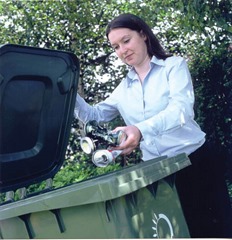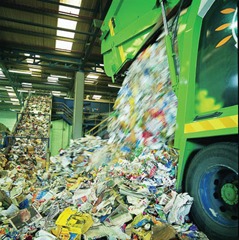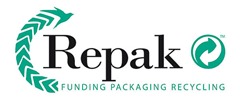Repak reaches its targets
 The producer responsibility scheme for packaging waste, Repak, is achieving its low cost packaging compliance targets and has invested €253 million into the Irish economy to date.
The producer responsibility scheme for packaging waste, Repak, is achieving its low cost packaging compliance targets and has invested €253 million into the Irish economy to date.
Repak was established by industry in 1997 to help Ireland met its EU packaging recovery and recycling targets. As a not for profit, it was the first producer responsibility scheme established in Ireland. Repak’s role is:
• to offer complince to obligated business; and
• to meet Ireland’s packaging recycling targets at the lowest practicable cost.
Recycling success
Repak with other stakeholders has helped Ireland to grow its packaging recycling from under 15 per cent in 1997 to over 79 per cent recovery and 72 per cent recycling in 2011 (the last official EPA figures). Repak helped Ireland to meet and exceed its 2001, 2005 and 2011 EU packaging recycling and recovery targets. Ireland is now seventh amongst the Euro 27 for packaging recycling. Repak has achieved this, whilst still being in the lower quarter of European compliance schemes for overall costs.
Recycling savings
In 2011, Repak collected €25 million from over 2,200 participating member companies in packaging levies to support packaging recycling. Repak’s average cost per tonne recovered is now circa €40, down from a previous high of €47 per tonne. This compares favourably to other European schemes as well as other Irish compliance schemes such as those in WEEE and Farm Films. Since its inception, Repak has helped divert over 7 million tonnes of used packaging from landfill diverting it into recycling or recovery. Indeed today over 85 per cent of all tonnes supported by Repak are recycled with only less than 15 per cent being recovered tonnes.
Where does the money go?
Over 80 per cent of the annual fees paid to Repak go directly to fund packaging recycling collections, from green bins, bottle banks and recycling centres and from businesses’ back door. The remaining amount, excluding overheads, is used to help promote packaging recycling education programs and packaging prevention programs to reduce the amount of packaging on the market in the first place. Educational programmes undertaken by Repak have been important in helping to drive Ireland’s packaging recycling rates from under 15 per cent in 1998 to almost 72 per cent (according to the latest EPA figures) over the last 16 years. Repak could not have achieved this without the support of members, government, local authorities and recovery operators.
 How does Repak keep its cost down?
How does Repak keep its cost down?
Central to the whole Repak model is the concept of shared responsibility based upon the principles of producer pays and polluter pays. This means the cost of recovering and recycling packaging is shared amongst householders in their waste charges, the waste contractors and “producers” in terms of their payments to Repak. Despite a growth in tonnes recovered and recycled, Repak has managed since 2008 to hold its fees to members. This has been possible by reducing its costs by €4 million since 2009.
Is Repak the only means of compliance?
No, Under Packaging Regulations if a business exceeds the threshold of obligation, (turnover greater than €1 million and supplies packaging or packaged goods with a total weight exceeding 10 tonnes) also known as ‘de minimis’ then they have two options. Either self-comply (take back packaging themselves and register with the local authority) or alternatively join a collective recycling scheme like Repak. Currently, Repak is the preferred option of the majority of compliant companies with nearly 2,200 businesses choosing Repak versus 140 companies who have chosen to correctly register as self-compliant and “take back” packaging themselves.
How important is Repak to the Irish recycling/waste sector?
Repak has a very positive role in helping Ireland not only meet its packaging recycling targets but other EU recycling and recovery targets such as its landfill bio diversion targets, its overall municipal waste and household waste recycling targets. According to Repak packaging recovery reported in 2011 accounted for 47 per cent of all municipal solid waste (MSW) recovered despite packaging being only 34 per cent of all municipal waste as measured in the EPA 2011 waste database report. Indeed commercial packaging tonnes recorded, as supported by Repak, account for 8 in every 10 tonnes of commercial waste recovered in Ireland in 2011. Overall, since the start of Repak in 1997 it has invested over €253 million in supporting packaging recycling in Ireland, investing over €20 million in direct supports per annum paid to recovery operators and local authority collectors. Also Repak directly or indirectly funds household recycling bins reaching 95 per cent of all household, 2,000 bring bank sites and 100 recycling centres for the packaging collected and sent for recycling.
What challenges does Repak face?
Currently, the biggest challenge facing Repak and other producer responsibility schemes in Ireland is the Producer Responsibility Initiative (PRI) review, which could fundamentally change the operation of the packaging and other compliance markets. We are confident, given the success of the Repak model to date, that there will not be any fundamental changes in the packaging area.
However, the possible introduction of a ‘packaging tax’ – which was put out for consultation in 2011 but was a subsequently deferred and then included in the PRI review – is one we hope will be finally put to bed. The introduction of such would not only face strong objections from business but fundamentally impact on the currently successful Repak business model.
The re-draft of the EU Packaging Waste Directive which is currently under review by the EU – with the objective of potentially better aligning the individual waste directives with the overall Waste Framework Directive – is something of concern for the future. The latter of which has a 50 per cent material-specific target for household waste, which if transposed into the packaging directive could be particularly challenging for some material waste streams, such as plastic packaging for example. Currently, our targets in the Packaging Directive can be met from both commercial and household packaging.
With Ireland currently recycling 72 per cent of its packaging waste, future growth is likely to only come from recovered packaging waste. The new landfill levies introduced in 2011 by Minister Phil Hogan TD have helped divert more and more waste from landfill and into recycling, waste to energy and alternative recovery through RDF and SRF.
Last year was the first full year of operation of Ireland’s indigenous MSW waste to energy plant in Carranstown. This plant, with a licensed capacity of 200,000 tonnes, is already operating to full capacity, proving the demand for further waste to energy capacity as planned with the Dublin waste to energy plant in Ringsend. In the meantime, Repak is seeing a greater growth in SRF and RDF.
Repak is confident that the current shared responsibility model and our partnership approach with members, government, local authorities and waste contractors will continue to deliver into the future.
Red Cow Interchange Estate
1 Ballymount Road, Dublin 22
For information, contact Repak (asking for sales) on 01 467 0190 or e-mail info@repak.ie






